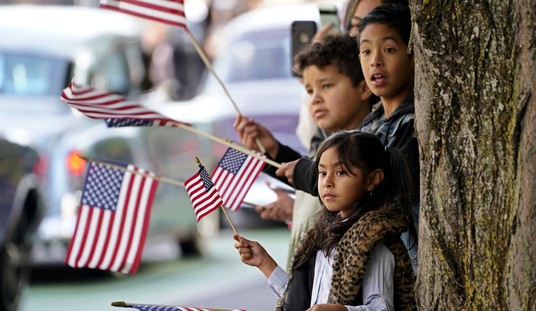The standoff in the Gulf of Aden continues, with the US Navy bringing more assets to bear on the lifeboat where pirates hold the captain of the Maersk Alabama hostage. However, they lost control of Richard Phillips briefly when the captain leapt out of the lifeboat and tried to swin for the USS Bainbridge. The pirates jumped back in the water and retrieved him:
Richard Phillips, the captain of a U.S.-flagged cargo ship, tried to escape from pirates Thursday night by jumping out of the lifeboat where he’s being held, a U.S. official said Friday.
Phillips was believed to be trying to swim to the USS Bainbridge, a naval warship that is in communication with the gunmen holding Phillips off Somalia’s coast, the official said.
The pirates jumped into the water, recaptured him, and returned him to the lifeboat, according to the official.
The U.S. military has every reason to believe that he was unharmed in the incident, the official said.
I’m hesitant to second-guess an ongoing operation, but why didn’t we react in time to rescue Phillips? It seems to me we should have anticipated an escape attempt, and had people ready to assist him if he broke free. Phillips must have thought so as well; surely he didn’t contemplate having to swim all the way up the side of the Bainbridge to make his escape successful.
Meanwhile, Andy McCarthy at National Review says that piracy has returned because of an overweening desire for civilization to feel good about itself rather than protect shipping lanes from barbarians:
The men who founded our country and crafted our Constitution understood this. They understood that the “rule of law” was not a faux-civilized counterweight to the exhibition of might. Might, instead, is the firm underpinning of law and of our civilization. The Constitution explicitly recognized that the United States would have enemies; it provided Congress with the power to raise military forces that would fight them; it made the chief executive the commander-in-chief, concentrating in the presidency all the power the nation could muster to preserve itself by repelling evil. It did not regard evil as having a point of view, much less a right to counsel.
That’s not our position anymore. The scourge of piracy was virtually wiped out in 19th century because its practitioners were regarded as barbarians — enemies of the human race (hostis humani generis, as Bret Stephens recently reminded us in a brilliant Wall Street Journal essay). They derived no comfort from the rule of law, for it was not a mark of civilization to give them comfort. The same is true of unlawful enemy combatants, terrorists who scoffed at the customs of civilized warfare. To regard them as mere criminals, to assume the duty of trying to understand why they would brutalize innocents, to arm them with rights against civilized society, was not civilized.
We don’t see it that way anymore. Evil is now just another negotiation. Pirates and terrorists are better known for their human rights than for their inhuman wrongs. On Thursday, America’s commander-in-chief didn’t want to talk about the pirates — “Guys, we’re talking about housing right now,” he chided a reporter who dared to raise the topic as the Somalis held the American ship’s captain hostage. Secretary of State Hillary Clinton, meanwhile, was dispatched to assure the public that the world would come together to deal with this “criminal activity” — a relief if you were wondering whether the naval destroyer on the scene was equipped with Miranda-warning cards.
This is the self-destructive straitjacket for which transnational progressives are fitting us. Indeed, the Law of the Sea Treaty — a compact Obama would commit us to — has hopelessly complicated the rules of engagement under which the pirates have thrived, just as Protocol I of the Geneva Conventions (a treaty Ronald Reagan was prudent enough to reject) has become an offensive weapon for jihadists everywhere. Having harnessed ourselves, we are once again the weak horse.
We don’t need a President commenting on ongoing hostage negotiations to have a strong policy against piracy, but otherwise Andy’s dead-on correct. It springs from a Western infatuation with moral relativism, where we’re no longer allowed to consider groups of people barbaric, even when engaging in the execution of gays (Iran) or wholesale slaughter of people through starvation policies (Zimbabwe). When we decided that evil no longer exists and all became Freudians, we stopped defending civilized behavior and started excusing uncivilized behavior. The piracy issue is just the latest example of that trend.
That’s not Barack Obama’s fault, as it started long before he arrived on the political scene. Nor can Obama be blamed for the rise of piracy over the last few years in the Gulf of Aden, as he just became President 80 days ago. How we react to this incident and how we treat piracy in the future is definitely a test for Obama and his worldview, however. Given Obama’s propensity to treat radical Islamist terrorists the same as street thieves and gangs, it would appear that the moral-relativist, Miranda-warning approach to piracy will continue.








Join the conversation as a VIP Member